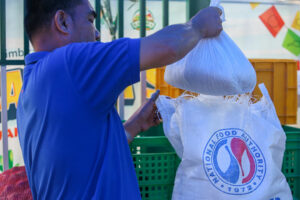THE Department of Agriculture (DA) said it launched a digital registry to track beneficiaries of the government’s P20-per-kilo rice program.
The P20 Benteng Bigas Masterlist Registry System is designed to provide a centralized and updated database of eligible beneficiaries, allowing the DA and partner agencies to streamline support and manage rice allocations for vulnerable consumers.
“Layunin nito na mas mapabilis at mapadali ang pagkakakilanlan ng mga qualified beneficiaries ng P20 rice progam upang maabot ang target natin na 15 million households na maserbisyuhan ng murang bigas sa 2026 (Its goal is to make it easier and faster to identify qualified beneficiaries of the P20 rice program, helping us reach our target of serving 15 million households with affordable rice in 2026.),” Agriculture Secretary Francisco P. Tiu Laurel, Jr. said in a briefing.
The registry is part of the “Benteng Bigas Meron Na” program, which aims to provide affordable rice to vulnerable members of society, including senior citizens, solo parents, persons with disabilities, Pantawid Pamilyang Pilipino Program (4Ps) beneficiaries, farmers, fisherfolk, minimum-wage earners, and transport workers.
Eligible beneficiaries can register at Kadiwa stores and other designated outlets, where they will be issued a unique QR code for scanning during purchases.
Mr. Laurel said the use of QR codes will be gradually implemented, with full enforcement planned by March.
The registry’s “P20 BeneFinder” lets store staff instantly verify a buyer’s eligibility and monitor their remaining rice allocation for the month. Indigent beneficiaries may purchase up to 30 kilograms of rice a month, while farmers and fisherfolk have a cap of 10 kilos.
Since its launch early this year, the P20 rice program has expanded to 81 of 82 provinces, with Tawi-Tawi expected to be included by the end of the week.
The DA aims to establish a Kadiwa or designated P20 outlet in all of the more than 1,600 cities and municipalities nationwide. Mr. Laurel said this will require the DA to open roughly five new sites per day in 2026.
Beyond providing cheaper rice to vulnerable households, the program also guarantees a market for domestically grown rice, which the National Food Authority (NFA) purchases from farmers at prices higher than those offered by traders.
The project will be funded through the NFA’s P9-billion budget for 2026 and a proposed P10 billion for the “Rice-for-All” program. The DA said it also maintains a P5-billion contingency fund this year, of which about P4 billion remains.
“Technically, it’s P19 billion for the 2026 (budget), but we have contingency funds of P5 billion, with about P4 billion remaining. So, almost P23 billion in total,” Mr. Laurel said.
The DA said additional features, such as alternative payment methods, will be integrated into the registry system over time. The system allows for deployment in areas with limited internet connectivity. — Vonn Andrei E. Villamiel
